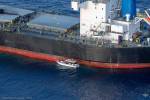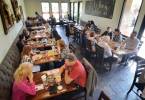Las Vegas WWII veteran honored for gallantry
More than 70 years after Frederick Giesz landed on France’s Normandy coast to help liberate the Nazi-occupied country, the French government will show its appreciation for his gallant actions as a U.S. Army soldier by presenting him with a Legion of Honor medal Thursday night.
A representative of the French Consulate General will pin the prestigious medal on the 92-year-old veteran during a concert by the UNLV wind orchestra to benefit the university’s Student Veterans Scholarship Yellow Ribbon Fund.
Giesz, who moved to Las Vegas four years ago from Florida, will be joined by local World War II veterans Davis B. Leonard and Gaetano R. Benza. They received Legion of Honor medals in June.
The National Order of the Legion of Honor award gives the men the rank of “chevalier” or knight. It is the highest honor France bestows on its citizens and foreign nationals.
Giesz said he is humbled but proud to be a recipient of the medal.
“It’s almost confusing to me after so many years,” he said. “It makes me feel like I’m somebody.”
Giesz, whose hometown was Buffalo, N.Y., enlisted in the National Guard in 1938. His unit had already become part of the regular Army at the onset of World War II. By the time the U.S.-led invasion of Normandy began on June 6, 1944, he was in Liverpool, England, waiting to be shipped to Omaha Beach as a replacement soldier “eight or 10 days” after D-Day.
“We were still under sniper fire at the time,” he said, recalling how he stepped onto Omaha Beach from a landing craft then proceeded to join the 120th Infantry Regiment of the 30th “Old Hickory” Infantry Division at St. Lo, France.
Lugging a .30-caliber M1 rifle, which he later replaced with an M1 carbine and .45-caliber pistol, he endured patrols through hedgerows from St. Lo to Mortain, France. After he laid communication wire-lines to front outposts, he was assigned to work the company’s switchboard.
“When you start out, you have an outpost for fellows way up in the front. Then you have fellows in the foxholes behind them doing the fighting. We would come up behind them,” he said.
Being an infantryman, “we did a lot of walking,” he said, describing encounters in France and later Germany. “Sometimes it was fierce. Sometimes it was a piece of cake.”
He said he was “bored” at one point being a switchboard operator so he offered to swap positions with a driver for an intelligence officer, a battlefield-commissioned second lieutenant who interrogated captured enemy soldiers.
During this time he was wounded twice. The first was “a scratch on the arm,” but the second was an injury he suffered when a tank fired at a building he was inside of in Aachen, Germany.
“I’m not sure if it was shrapnel or bricks, but I was wounded and spent three weeks in the hospital in Belgium,” he said.
He was in a town on the Elbe River when the war in Europe ended in 1945.
“We waited there for the Russians to come,” he said. “Story goes, we had to stay there to give the Russians a chance to take Berlin.”
Contact Keith Rogers at krogers@reviewjournal.com or 702-383-0308. Find him on Twitter: @KeithRogers2.






























